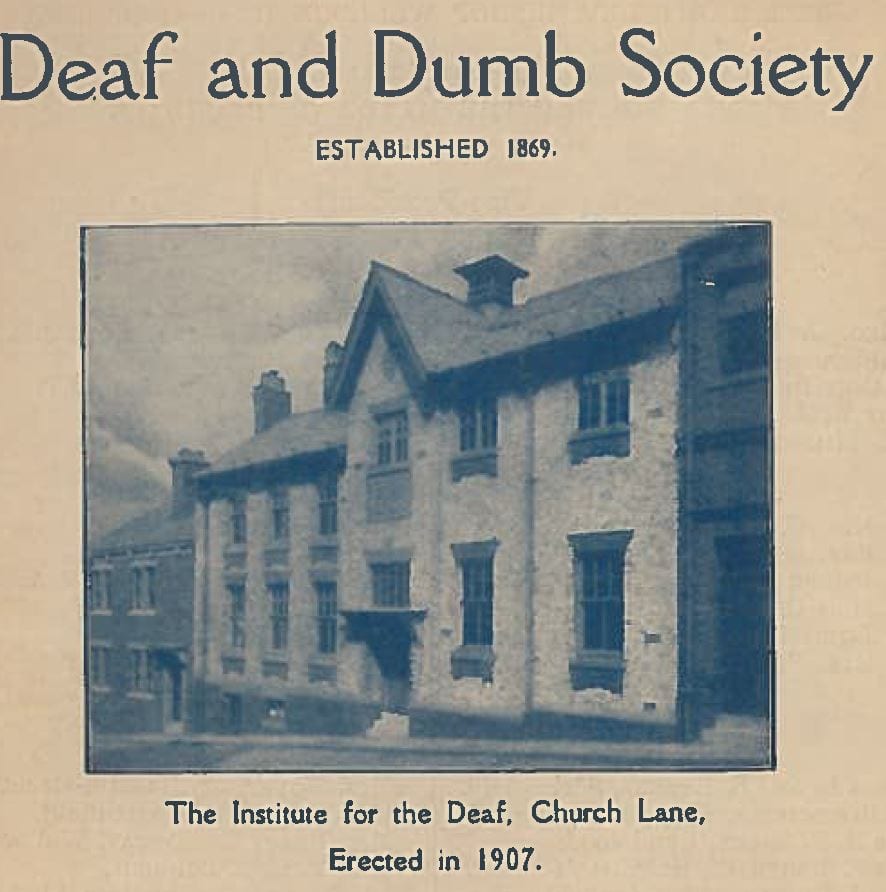The Rochdale Mission – “from advice in filling in forms to extensive case work with problem families” – the importance of mission work
By H Dominic W Stiles, on 8 March 2019
The Rochdale Mission to the Deaf was an offshoot of the Bolton Mission, which had started in 1869. In 1907, Rochdale became a separate society, and the building illustrated here was built. The earliest mission report we have is for 1927, when the ‘Lady Superintendent and Missioner’ was Mrs Hoyle, who was still there in 1944 but had made way for Mr C. Crabtree by 1947. It seems that the previous year (1926) they had become affiliated with the National Institute for the Deaf, which had founded its own regional associations, including the Northern Counties Association for the Deaf. “This branch consists in the union of all the societies for the deaf in the six Northern Counties, and its object is mutual help and encouragement” (127 Report, p.2). That same year they celebrated the golden wedding of Mr & Mrs C. Birtwhistle, who were pioneers of the society.
The 1960s reports have these attractive drawings of Rochdale on the covers – I think the signature is Harold Hemmingway.
The 1962-3 report shows us the importance of local missions went way beyond ‘spiritual welfare’ or the social club. The Superintendent was the Rev. T.B. Murray.

GENERAL WELFARE
The word “welfare” is used here as a general term. covering a wide range of services for the deaf, from advice in filling in forms to extensive case work with problem families. It would be impossible to mention every detailed piece of work which might be included under this heading so the following paragraphs are intended merely to outline the different types of problems encountered in welfare work for the deaf.Interpretation
The complicated set-up of present-day social services means that all social work agencies have as an important function the interpretation of these services to the general public. The deaf general public, like the hearing. often do not know what help is available for a particular need, nor how to set about applying for it, but three consequencies [sic] of their disability further complicate matters for the deaf. Firstly, the difficulties of communication often prevent them from making use of the services even when they know they exist. Secondly, as a result of their limited education, they are often poor writers and readers, unable to cope with letters, papers and forms. And thirdly, as a consequence of their inability to understand and be understood by hearing people, the need for interpreting extends to more aspects of life than the social services. Religious and civil ceremonies, business transactions, legal work and many other matters have to be interpreted in two senses, i.e. the meaning has to be explained and the whole translated into language the deaf person understands.Over the past twelve months the Superintendent of the Society has been called in to assist by interpreting in courts of law, in hospitals and doctors’ surgeries. opticians and dentists. He has been called in by probation officers, hospital almoners. officers of the National Assistance Board and Ministry of Labour, lawyers and solicitors, and officers of other Voluntary Societies. The deaf have enlisted the help of the Superintendent in dealing with hire purchase, National Health Insurance matters, pensions, income tax returns and refunds, trade union matters, and many other matters the deaf have found difficulty in understanding without assistance. (1962/3 Report, p.5)
We have reports for 1927-34, 1936/7, 1943/4, 1947-52, 1955-1966.
 Close
Close

